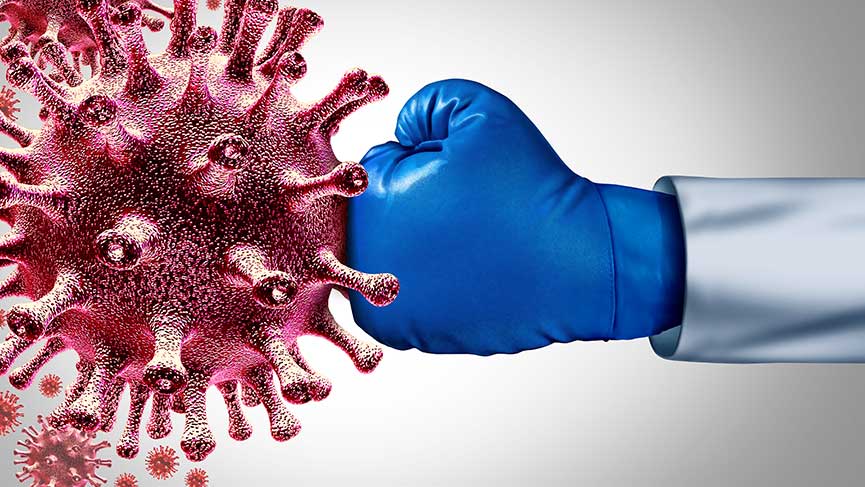When and How is Immunotherapy Administered?
 Learn more about about immunotherapy
Learn more about about immunotherapy
When and How is Immunotherapy Administered?
Make immunotherapy more effective and more powerful attacks the body's immune system against cancer cells by raising or stopping the growth and spread of cancer cells to the cell aims to completely eliminate. Immunotherapy is not preferred in early stage cancers. This method is often used in stage four cancers, at stages when the disease has also spread to other organs. The drugs to be used in this treatment are given to the patient through a vein.
Immunotherapy Uses One's Own Immune System
In addition to radiation therapy and chemotherapy in the fight against cancer, a person's own immune system can also be used for therapeutic purposes. This treatment, which helps destroy cancer cells by supporting body resistance, is called immunotherapy. Make immunotherapy more effective and more powerful attacks the body's immune system against cancer cells by raising or stopping the growth and spread of cancer cells to the cell aims to completely eliminate. The immune system often identifies cancerous cells and prevents the development of these cells with an attack mechanism, but in some cases, various types of cancer disable the body's defense mechanism. Thus, cancer cells that do not encounter any defense mechanism multiply uncontrollably and spread over a larger area.
In Which Types of Cancer Can Immunotherapy Be Used?
Immunotherapy can be used to treat many types of cancer. With the new generation immunotherapy drugs produced today, significant successes are being achieved in small cell and extracellular lung, head and neck, melanoma, kidney, bladder cancers, breast and colon cancers in some subgroups. Today, especially in some types of melanoma and lung cancer, complete healing can be achieved even in advanced disease without using chemotherapy, only with immunotherapies that stimulate the immune system.
Are There Any Side Effects of Immunotherapy?
The side effects of the new generation immunotherapy drugs are much less and manageable than traditional chemotherapies. In this method, there are no problems that seriously reduce the quality of life, such as hair loss, nausea and vomiting that develop during chemotherapy. With immunotherapy, side effects such as weakness, diarrhea and fever are most often observed. Autoimmune reactions such as thyroiditis, hepatitis, pancreatitis, conjunctivitis (inflammation of the conjunctiva layer in the eye), hypophysitis (inflammation of the pituitary gland) and arthritis can occur, but these are extremely rare. All these effects can also be mostly controlled with drug treatments.
Immunotherapy Treats in 3 Ways…
1) Monoclonal Antibody
The body's defense mechanism defends itself against any substance that it considers foreign and harmful. As soon as it is determined that these substances are in the body, structures called protein-based antibodies are produced by the immune system for protection. Monoclonal antibodies are structures that are produced in a laboratory environment and injected into the body through a vein in cases where antibodies cannot be produced by the body. These antibodies are a type of immunotherapy that aims to destroy the cancerous cell or prevent its development by determining the location of the cancerous cell in the body and acting on the surface of the cell or the area that hosts the cell. In addition, along with the radioactive substances it carries, it can also be used for the diagnosis of cancer types such as ovarian and prostate cancer.
2) Non-Specific Immunotherapy
It is another type of immunotherapy given to the patient simultaneously with or after chemotherapy and radiotherapy treatments. Non-specific immunotherapy is grouped in two different ways:
Interferon: It is a type of protein produced in the laboratory to strengthen the immune system. There are side effects. From the moment this type of immunotherapy is applied to the patient; conditions such as headache, fatigue, nausea may occur.
Interleukin: It is an immunotherapy mainly used in the treatment of melanoma type of skin cancer and kidney cancers. After application to the patient; conditions such as high blood pressure, weight gain, nausea, headache may occur.
3) Cancer Vaccines
It is an application that activates the immune system together with an antigen injected into the body in order to trigger the working mechanism of the immune system. It consists of two types of vaccines:
Prevention vaccine: It is a vaccination process applied to raise awareness of the body's defense mechanism against conditions such as cervical cancer caused by HPV (Human papilloma virus). The hepatitis B vaccine can also be counted in this group.
Treatment vaccine: This is a type of vaccine that is injected into the body in order for the immune system to recognize and fight cancer and prevent its recurrence.
Immunotherapy in the Future
Immunotherapy is currently used in medicine as a supportive treatment for cancer treatments. In addition, it is also a method used in the treatment of lung membrane cancer, melanoma and lymphoma-type cancers. Immunotherapy is expected to be used more actively in cancer treatments in the future.
 Learn more about about immunotherapy
Learn more about about immunotherapy